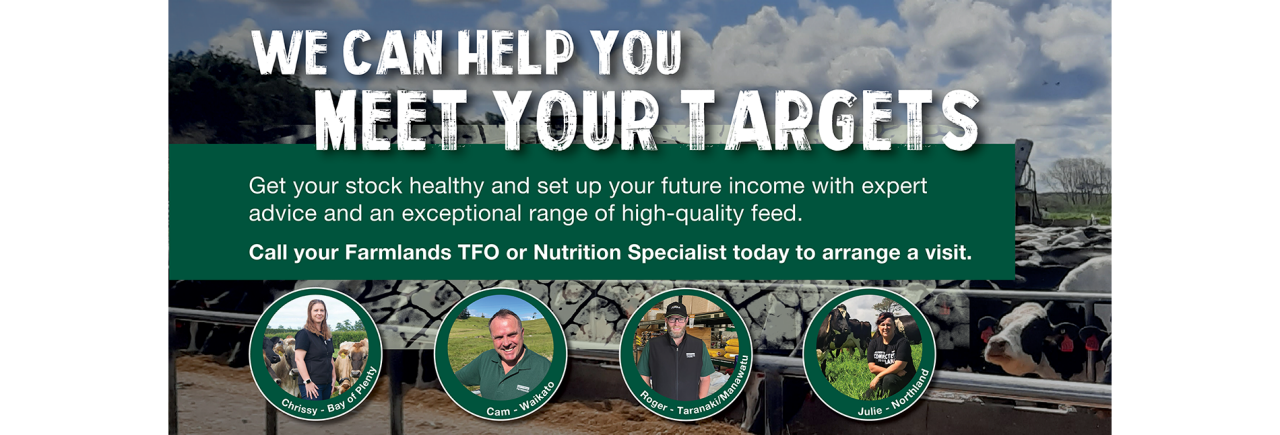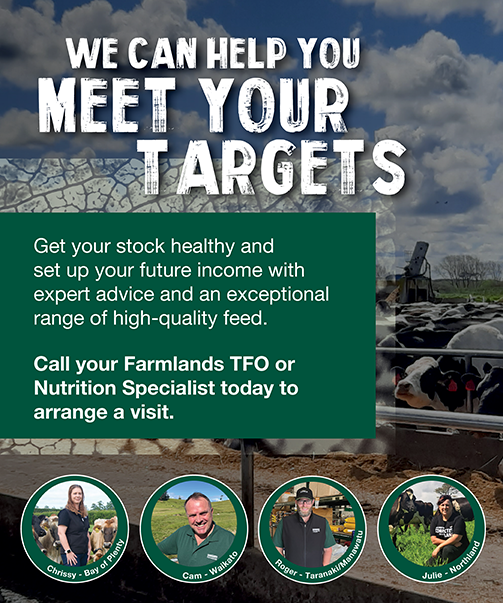
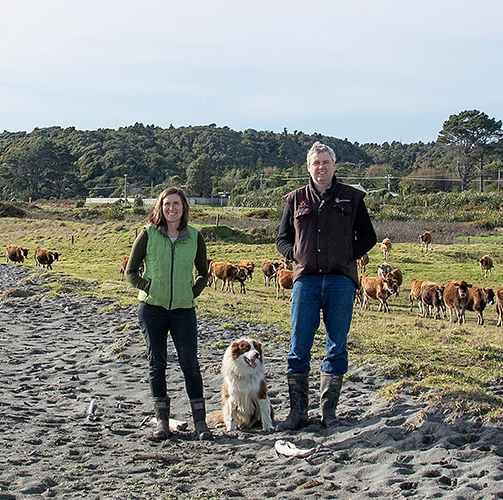
Striking Gold on the West Coast
A move from Canterbury to the West Coast has paid off for dairy farmer Paul Clement and his wife Abby, a rural GP. We spoke to them about their new life on the coast, and Paul’s one-man dairy farming operation.
The gold rush that put Hokitika on the map ended over a century ago, but the small West Coast town is still a land of opportunity for some. Paul and Abby couldn’t believe their luck when they happened upon a dairy farm for sale just north of Hokitika three years ago. For Paul, who had been working in corporate dairy farming for close to a decade, it presented a golden opportunity to finally own a farm of his own. But Abby says it ticked other boxes for them as well. “The price was a big bottom line because it ruled out most places, but we had other criteria,” she says. “One was that I needed to be closer to somewhere we could go swimming outdoors, because I grew up by the beach. I’m a water baby, I missed being close to the sea. We were thinking we might have to live near a lake, but lo and behold, we find out that actually, we can live on the West Coast and we have 4km of beach along our farm.”
The couple wasted no time getting involved in their new community, setting up the West Coast arm of Surfing for Farmers, a charity that helps farmers de-stress with the help of surf lessons and a BBQ. “We’ve just completed our second season and we’ve seen massive growth in numbers attending. We just love it over here and it’s a great way to give back to the West Coast community that has welcomed us,” says Paul. They also discovered they weren’t the only ex Cantabrians to have made the move. “We met another couple over here that had done a similar thing to us, and we got to know them reasonably well,” says Abby. “After 18 months we realised we were neighbours in Canterbury for five years and didn't actually know each other. It's a small world, but it probably shows you the difference.”

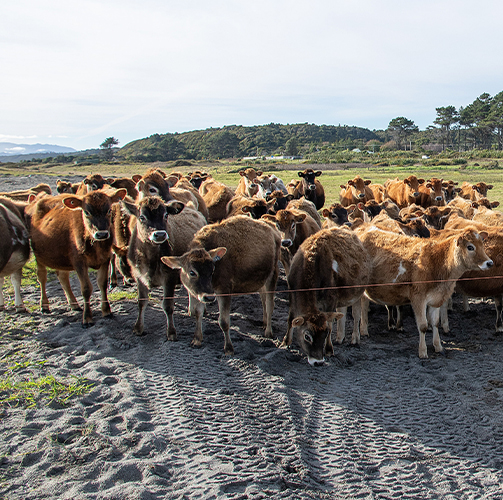
Early Days
Abby’s love of the ocean can be traced back to her childhood living in the seaside Christchurch suburb of Sumner. Paul has always lived rurally, growing up on a sheep farm. The couple have been together since their last year of high school, with Paul completing a BComm in agriculture at Lincoln University while Abby did her medical studies. Coming out of university, Paul had a stint in rural banking. “I think by the end I got sick of talking to farmers about farming, as opposed to farming myself,” he says. When he and Abby did their OE, Paul ended up working on a cattle ranch in Canada for six months. “That was probably the catalyst for me rekindling my passion for hands-on farming.” He got his big break in dairy farming in Hastings, where they spent a year while Abby did her first placement as a doctor at the local hospital. Although his plan was to get a job at a sheep and beef farm, it was a dairy farm that gave Paul a start as a farm assistant. “I was pretty green; although I had uni and high school summer jobs and grew up on a farm, I'd never actually had a full-time job on a farm.
“They looked past that and could see transferable skills, where perhaps the sheep and beef guys were a bit more narrow-sighted. So that was great. Within six months of that job, I was 2IC, and that gave me a great start in farming.” Meanwhile, Abby had quickly decided working in a hospital wasn’t what she wanted to do. “I had been thinking of giving GP training a go, and so now I'm a rural GP and I haven't looked back. It's a really cool job, but it's very, very challenging.” Abby says one of the rewarding things about general practice is making a difference for people and being there for them. “The other rewarding part about being a GP is you get to basically sit through as almost an observer of people's lives. I have little chats with elderly people every day that make me smile. You just take a wee moment of your time and make a connection with people. In a hospital, you don't get any of the continuity that comes once you know people.”
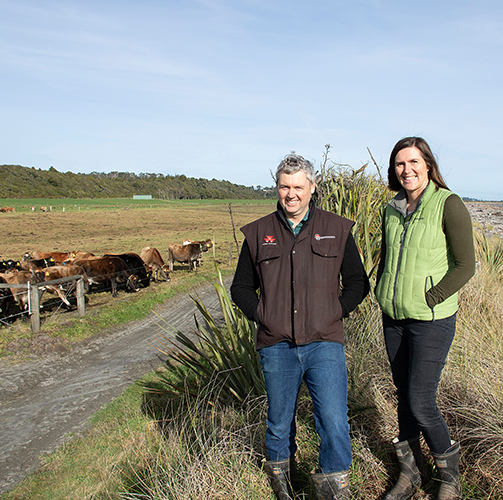

Corporate Farming in Canterbury
After leaving Hastings, they went overseas again briefly before settling in central Canterbury. Paul worked in corporate dairy farming, while Abby started her career as a GP. Although they were both successful in their careers, Paul says by the end they had a growing feeling of dissatisfaction about what they were doing in Canterbury. “We'd never really had goals, so it was always just taking opportunities when they came. We'd been with one corporate on one farm for 10 years, and you always know in thosesituations that that's not where you're going to be forever. I got pretty high up, into professional farm management roles, but I was doing very little hands-on farming or milking the cows or anything.” With kids coming along (they now have three children), they started to think about their next steps, and although they looked at other options, they came across a 123ha dairy farm on the West Coast that ticked the most boxes. For Paul, it was an opportunity to get back to doing what he loves. “It’s very different because I'm actually doing everything myself,” he says.
“I don't employ staff. Abby shouldn't be helping me; if Abby has time to help me, she should be spending more time in the medical clinic! Every now and then I get a relief milker, and I get some help through calving, but otherwise it's doing my own thing, doing everything hands on, so that’s been a massive change.” Paul says the first year on his farm was “eye-opening”, with the biggest difference between dairy farming in Canterbury and on the West Coast being the level of consistency. “In Canterbury you've got much less day-to-day variability in terms of weather, and you’re generally farming on one soil type. The whole farm can be treated equally, and the farm is very similar to the neighbour, and probably half an hour down the road as well,” he explains. “Whereas here we've got five different soil types on a farm that's a quarter of the size of the farms in Canterbury. We live 5km out of Hokitika and they might get 90ml of rain and we might get 10ml or vice versa, so the inconsistency creates a lot of challenges, and the climate is certainly way different. It’s milder over here, but there's lot of rain, and you need to manage that and be prepared for that all the time.”

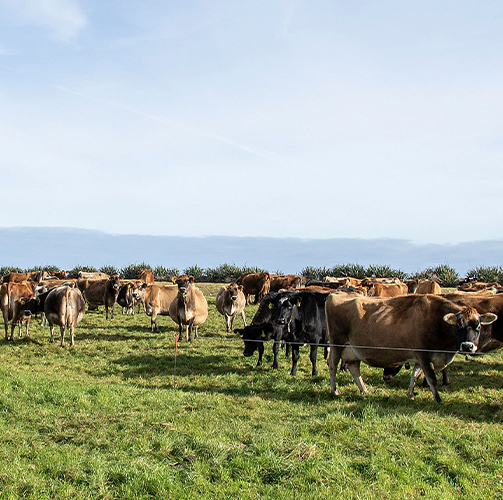
Tinkering With Schedules
Paul says his farm is “relatively intensive”, although with around 200 cows his stocking rate is about half of what is typically seen on Canterbury dairy farms. He has been milking twice a day until around Christmas/New Year, and “playing around” with what to do prior to that. “The old farm owner used to religiously go once a day on Christmas day,” he says. “I was against once a day just from a lost production perspective, so I tried a few other things like three milkings every two days, and 10 in seven. We just don't produce the same as what cows do in Canterbury, so we need an alternative to twice a day for that second half of lactation. The other thing is I just could not do twice a day on my own for a whole season.”
This year, Paul finally built up the confidence to go to milking once a day in January. “The results blew me away with how well that's gone, so that probably is what we're going to stick to now, and the next thing is to think about how early we could actually get away with going once a day.” For Abby, the biggest difference on the West Coast is that despite it being a “lovely place”, they struggle to recruit medical staff to the area. “We're trying to do more with less and you certainly feel it. The patients may present sicker because they've had to wait longer for their appointments, so that can cause challenges as well as the socioeconomics here. There’s more deprivation, which has health flow-on effects.” Despite the challenges, they love their new community, and their property which features not just a beach but a lagoon, native bush, creeks teeming with eels and whitebait, and abundant birdsong. “The biodiversity here is pretty amazing,” says Paul. “You’ve got to pinch yourself some days.”
